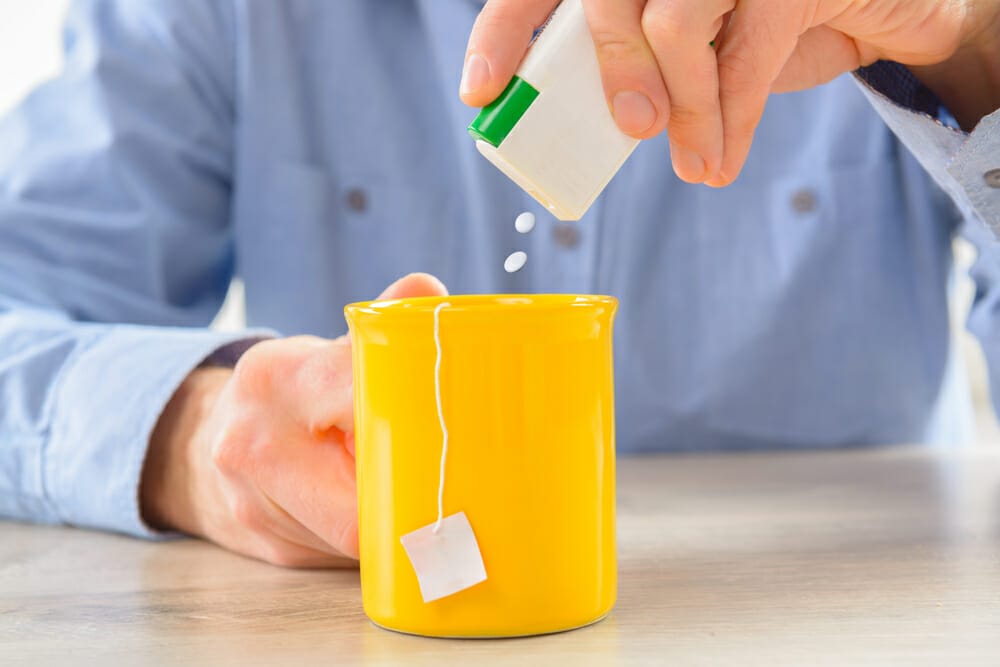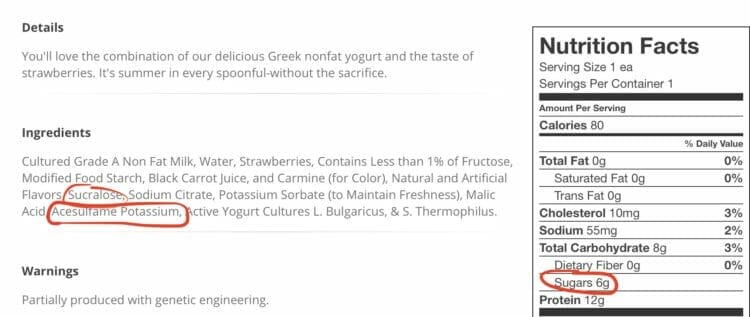- Healthy vs. Unhealthy Sweeteners
- Artificial vs. Natural Sweeteners
- Caloric vs. Zero-Calorie Sweeteners
- Artificial and Natural Sweeteners
- Brand Names of Low-Calorie Sweeteners
- How Have Artificial Sweeteners Become So Popular?
- Proliferation of Artificial Sweeteners
- Additional Risks of Consuming Artificial Sweeteners
- Frequently Asked Questions
- The Wrap-Up
Artificial sweeteners seem like they’re in everything we eat these days. Advertised as healthy substitutes for natural sugar, we often get conflicting information about the health benefits or dangers of non-caloric sweeteners.
In this article, I’ll explore the latest scientific evidence that clearly demonstrates the negative impact of such food additives on our health. For example, scientists have finally been able to prove that Sucralose can mess with the chemical processes that are responsible for metabolizing glucose.
I’ll also introduce you to healthier alternatives, such as monk fruit extract, and explain why they’re different from their lab-grown cousins.
Healthy vs. Unhealthy Sweeteners
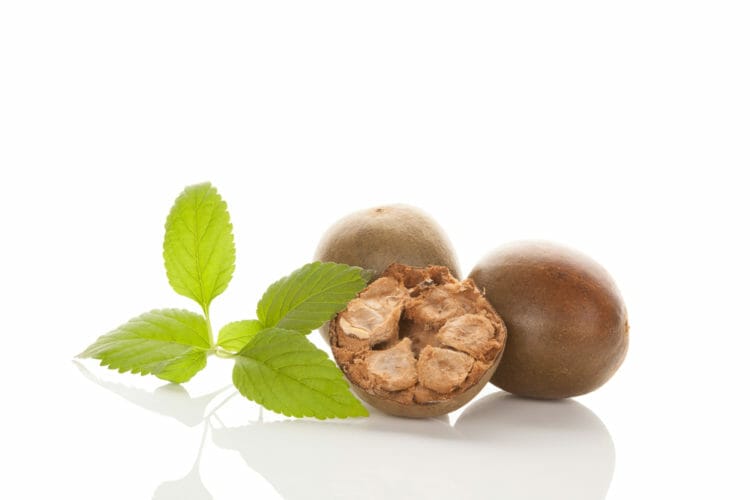
If you don’t have time to read the full article, below is a list of healthy and unhealthy sweeteners. To learn about the scientific evidence behind this rationale, continue reading.
- Stevia
- Monk fruit extract
- Sucralose
- Sugar alcohols (processed)
- Aspartame
- Acesulfame potassium
In general, I recommend reducing your daily intake of foods containing sweeteners to the bare minimum. If you must use sweeteners, as part of an otherwise healthy dietary lifestyle, stick with nutritive sweeteners like raw honey, organic maple syrup, agave nectar, or fruits.
Artificial sweeteners are just as bad for your health as sugar — and maybe worse!
Recommended options for non-caloric sweeteners include stevia and monk fruit extract. Due to their lack of calories, these two sweeteners don’t raise blood sugar levels.
Artificial vs. Natural Sweeteners
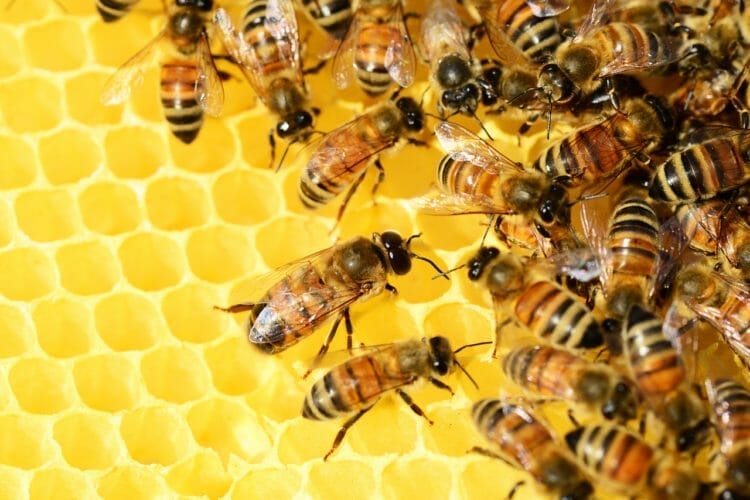
Before we jump into the nitty gritty, let’s make sure we understand the differences between natural and artificial sweeteners.
Simply put, natural sweeteners are just that — natural. They’re unrefined, or at least only minimally processed. Think of raw honey, organic fruits, and plant-based products like steviol glycosides (stevia).
The tricky part is that some sweeteners, such as erythritol — i.e., sugar alcohols — naturally occur in fruits. That’s why many people consider sugar alcohols a healthy alternative to white refined sugar.
Unfortunately, most of the erythritol you find in foods such as protein bars is highly processed and made from corn starch. As a result, I tend to consider this type of sweetener artificial.
Additionally, I always consider the evolutionary framework when judging the benefits and risks of food. That means I ask myself if our Paleolithic ancestors could have had eaten or had access to a particular food. For example, it’s reasonable to assume that early humans could have used the stevia plant to sweeten dishes.
On the other hand, Sucralose or Aspartame are products we make in a lab because they don’t occur in nature.
I do that check because I consider evolution to be the longest and most comprehensive dietary case study. What other research do you know of that was done on millions of people for millions of years?
Caloric vs. Zero-Calorie Sweeteners
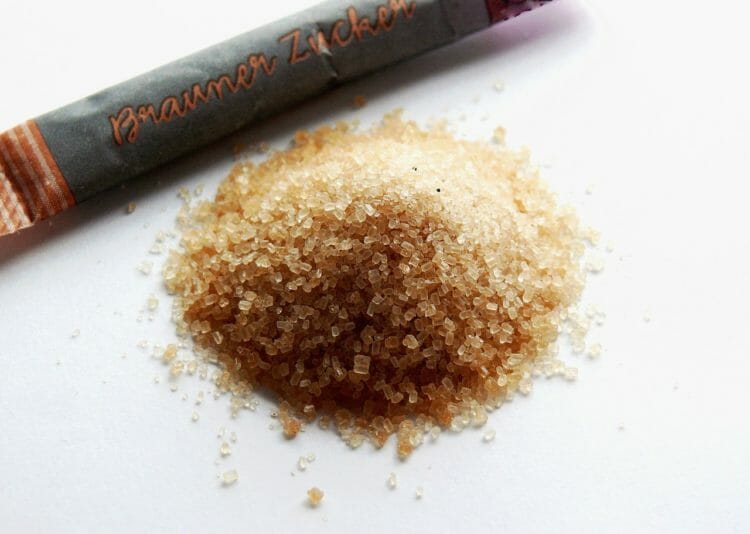
Besides the issue of artificial vs. natural sweeteners, we also have to take their glycemic index (GI) into account. The GI tells us what impact individual food has on our blood sugar levels. For reference, regular table sugar has a GI of 100.
Some zero-calorie sweeteners, such as Sucralose or Stevia, have a GI of 0. That means those sweeteners do not trigger the release of insulin caused by an increase in blood sugar levels.
However, some manufacturers exploit loopholes in the FDA labeling guidelines that allow them to claim their product has zero calories or 0g of sugar even if it hasn’t.
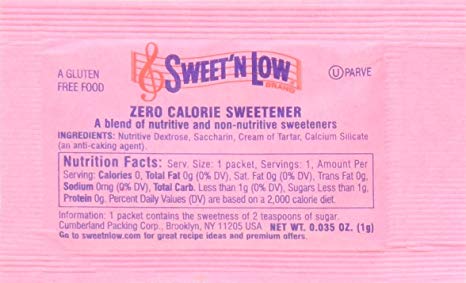
For example, if a product has less than 5 calories or less than 1g of sugar per serving, you can claim it has zero calories. However, if you apply that concept to a single-serving pouch of a “zero-calorie sweetener,” you can see how problematic that is. Instead of no sugar, you might be pouring 0.9 grams of sugar into your coffee with every serving.
Manufacturers of artificial sweeteners have long claimed that their products are healthy alternatives to regular sugar because of their lack of calories. That’s why the food industry started adding sweeteners into anything and everything — from soft drinks to baked goods and other sweet foods.
Unfortunately, back then we didn’t have any scientific evidence to prove that certain sweeteners have a detrimental impact on our health.
Today, we know that artificial, non-caloric sweeteners can confuse our body with regard to how it responds to glucose. In turn, that can lead to the same metabolic issues that non-caloric sweeteners were meant to prevent.
List of Nutritive Sweeteners
To help you better navigate the food label jungle, here is a list of common nutritive (caloric) sweeteners:
- Agave Nectar
- Barley Malt Syrup
- Beet Sugar
- Brown Rice Syrup
- Brown Sugar
- Cane Crystals (or, even better, “cane juice crystals”)
- Cane Sugar
- Coconut Sugar, or Coconut Palm Sugar
- Corn sweetener
- Corn syrup, or corn syrup solids
- Dehydrated Cane Juice
- Dextrin
- Dextrose
- Evaporated Cane Juice
- Fructose
- Fruit juice concentrate
- Glucose
- High-fructose corn syrup
- Honey
- Invert sugar
- Lactose (milk sugar)
- Maltodextrin
- Malt syrup
- Maltose
- Maple syrup
- Molasses
- Palm Sugar
- Raw sugar
- Rice Syrup
- Saccharose
- Sorghum or sorghum syrup
- Sucrose
- Syrup
- Treacle
- Turbinado Sugar
Artificial and Natural Sweeteners
Now that you know more about sweeteners, let’s take a closer look at the following common sugar alternatives to find out what health benefits and risks they have.
- Sucralose
- Sugar alcohols
- Aspartame
- Acesulfame potassium
- Monk fruit extract
- Stevia
Sucralose
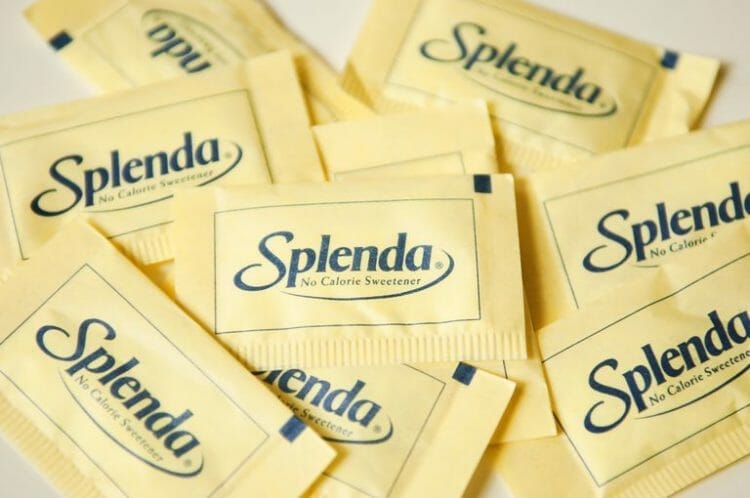
This sweetener is among the most popular non-caloric artificial sweeteners, and you can find it in many products that line grocery store shelves.
Sucralose comes from sucrose, and this derivative of ordinary table sugar is super sweet! Due to the sweetness level, manufacturers only need tiny amounts of this sweetener when producing soft drinks or other sweet foods.
What’s interesting about Sucralose is that the human body can’t break it down to use for fuel. As a result, consuming Sucralose doesn’t cause a spike in insulin.
Until recently, Sucralose enjoyed an image as an excellent and healthy alternative to caloric sweeteners, such as table sugar or high-fructose corn syrup.
Studies have shown that Sucralose is incredibly resistant to breakdown, and thus the body cannot metabolize it to glucose. That means we excrete most of it when we use the bathroom. We also know that there is no evidence that Sucralose is carcinogenic unless you consume it in much higher dosages than the suggested intake limit.
If a compound is “carcinogenic,” that means it can cause cancer.
Overall, there’s limited scientific evidence of any artificial sweetener being carcinogenic. That’s good news, right? Not so fast…
Impact of Sucralose on Glucose Metabolism
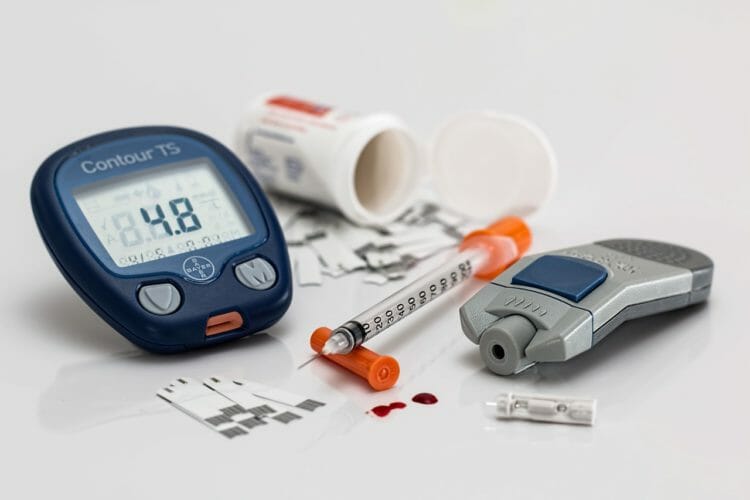
Most studies on the health impact of artificial sweeteners, such as Sucralose, have focused on their effects on the body’s insulin response.
The reason why simple carbs, and regular sugar in particular, are terrible for your health is that they cause your pancreas to release insulin. If that happens too often and for too long, your pancreas fatigues, and the cells in your body develop insulin resistance. This condition is also known as Type 2 diabetes.
The food industry tried to make us believe that non-caloric sugar alternatives were safe to consume because they don’t cause a spike in insulin levels.
Unfortunately, the body’s fine-tuned chemical processes are often more complicated than we want them to be. So while it’s true that sweeteners like Sucralose don’t make the pancreas release insulin, they do something potentially worse.
By consuming non-caloric sugar alternatives, you practically teach your body that there’s no need to release insulin if it comes across a compound that looks like sugar.
Once your body is used to that, it might stop releasing insulin even when it’s confronted with carbohydrates (glucose). That extra glucose in your bloodstream can then lead to a host of health issues, including metabolic diseases and — you guessed it — Type 2 diabetes.
That’s why when someone asks me “are sweeteners healthy,” I tell them that I consider these products to be just as bad, if not worse, than regular sugar.
Sugar Alcohols
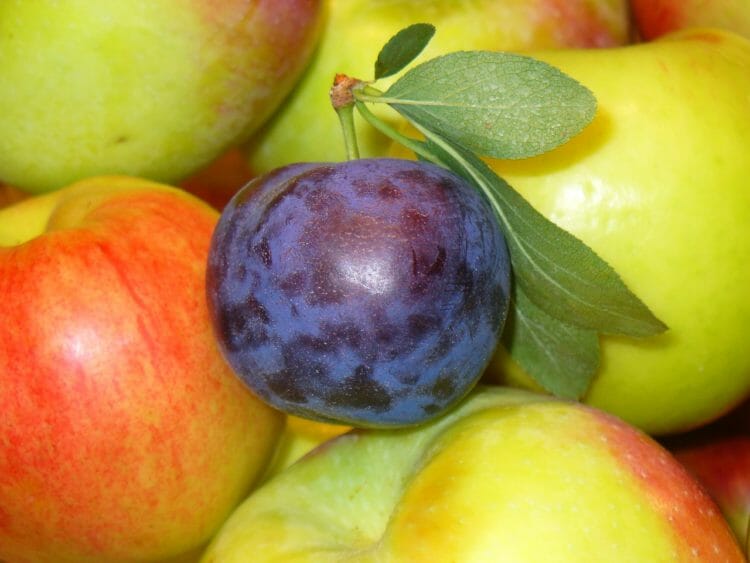
Sugar alcohols are another type of natural-turned-artificial sweetener that you’ll find on the nutrition labels of many processed foods.
Most sugar alcohols are much less sweet than Sucralose, and some food manufacturers use them in high quantities. I first came across sugar alcohols when looking for low-calorie protein bars. Lately, I’ve also seen them in meal replacement drinks, such as those offered by Soylent and Bear Power Foods.
While those sweeteners don’t contain any alcohol, contrary to what their name might suggest, they do have a few calories. From a metabolic perspective, that means that the body can only partially absorb them.
As a result, you can expect an insulin response, albeit an insignificant one.
From a long-term health perspective, I think that natural sugar alcohols are better than Sucralose because of the lower risk of confusing the body’s glucose response mechanism.
However, the reason why I stay clear of sugar alcohols is their potential for causing an upset stomach, bloating, diarrhea and or other GI issues.
Types of Sugar Alcohols
Below is a list of commercial sugar alcohols that you can find in many processed foods:
- Erythritol: Naturally occurs in some veggies and fruits.
- Lactitol: Made from milk sugar (lactose).
- Mannitol: Made from sugar and naturally occurs as a by-product in brown seaweed and fungus.
- Sorbitol: Naturally occurs in dates, prunes, apples, peaches and some vegetables.
- Xylitol: The favorite sweetener of the chewing gum industry.
Note that while some of the above sweeteners have natural sources, most of the sugar alcohols you find in processed foods and drinks are highly processed themselves. For example, the sweeteners in macro-brewed beer, soy sauce, protein bars, and meal replacement shakes are usually made from modified corn starch.
That’s the primary reason why I recommend staying away from foods and drinks containing sugar alcohols.
My Thoughts on Xylitol
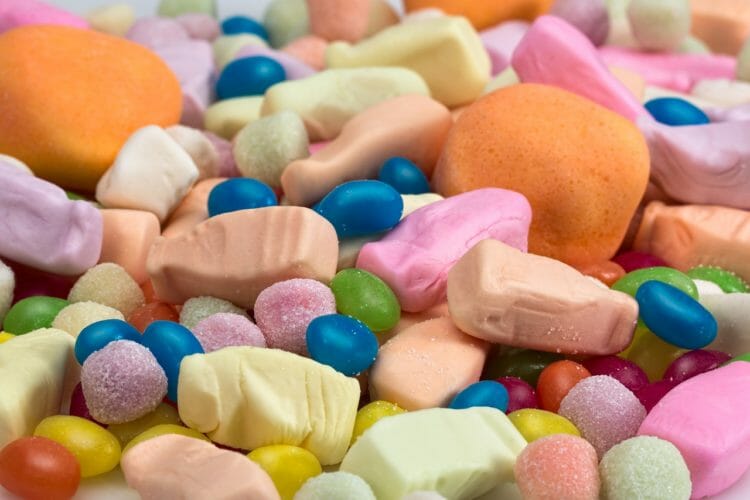
Xylitol is a very sweet substance that resembles sugar, and it naturally occurs in most plants and animals (as well as some micro-organisms). Comparable to the sweetness of Sucralose, some studies have suggested that xylitol can help reduce cavities.
As a result, food manufacturers started putting xylitol into sugar-free gum, sugar-free candies, and similar products. However, a meta-analysis of the few available studies conducted by the Cochran Institute revealed that the existing evidence is insufficient.
In other words, we don’t know yet if chewing xylitol gum can help prevent dental caries (i.e., cavities). We do know, however, that this sweetener can cause bloating and diarrhea, so consume it in moderation.
My Thoughts on Erythritol
As I mentioned above, erythritol naturally occurs in some fruits and veggies. The problem is that most commercially-used erythritol is made from corn starch. That makes it a highly-processed ingredient.
As a result, and unlike Stevia or monk fruit extract, the erythritol you can find in many keto products isn’t paleo-friendly.
That doesn’t make it something you absolutely must stay away from, but I recommend only consuming it when it’s made from unmodified corn starch, and even then only in moderation.
Two products that I occasionally consume that contain erythritol are the nut butters from SuperFat and Perfect Keto. The latter has recently published an article on the pros and cons of the substance, and I encourage you to check it out!
Aspartame
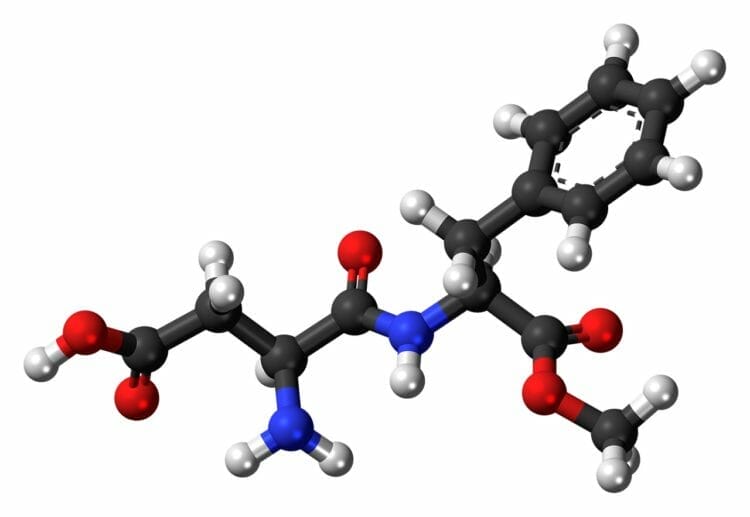
Aspartame is another widely-used artificial sweetener that manufacturers have added to over 6,000 different food and drink items! Compared to Sucralose, aspartame is over 200 times sweeter, which has contributed to its popularity.
Despite its widespread use, a recent meta analysis on the safety of aspartame has concluded that this artificial sweetener can cause damage to cells in the body. As a result, consuming aspartame increases the risk of systematic inflammation, even at consumption levels below the acceptable daily intake.
As a result, I highly recommend staying away from aspartame and any food containing it.
Acesulfame Potassium
Acesulfame potassium, or Ace K, is another artificial sweetener that’s about 200 times sweeter than sugar. Karl Clauss, a German chemist, accidentally discovered acesulfame in 1967, and the European Union later cataloged it under the name E950.
Studies on mice have shown that, much like Sucralose or saccharin, Ace K alters the gut microbiome, which can lead to metabolic diseases and body weight gain. So if weight loss is your ultimate goal, food additives such as Ace K are your enemy rather than your friend!
Monk Fruit Extract
Monk fruit extract is one of my favorite sweeteners because it’s natural and doesn’t have any known side effects. These are the main reasons why monk fruit extract is allowed on the paleo diet.
Having a history dating back over eight centuries, monk fruit extract is 250 times sweeter than sugar. As a result, you only need tiny amounts of it to sweeten food or beverages.
Unfortunately, monk fruit extract is one of the most expensive sweeteners on the market — which is why you don’t see it in a lot of products.
Stevia
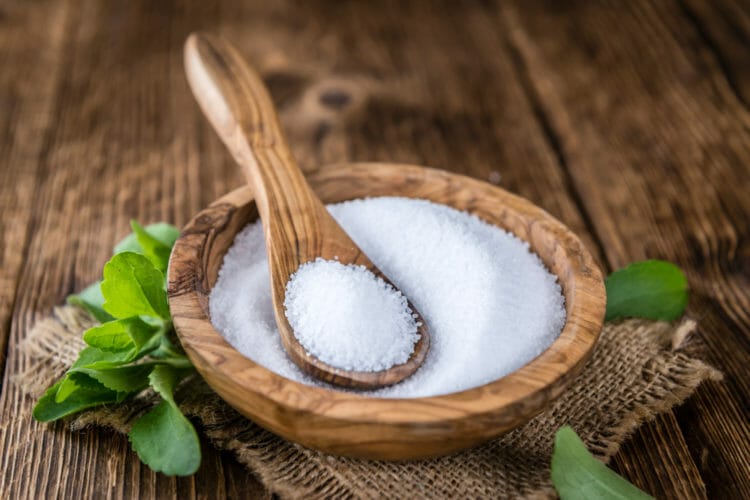
Perhaps the most popular natural and non-caloric sweetener out there is stevia. Harvested from the leaves of the Brazilian or Paraguayan stevia rebaudiana plant, stevia has been used for hundreds of years to add a sweet taste to food and drinks.
Much like other sweeteners, stevia is much sweeter than sugar (30 to 150 times), and it might have a slightly bitter aftertaste at higher concentrations. Because of its natural origin and usage history among the Guaraní people of South America, stevia is a popular sugar alternative in the paleo diet and among health-conscious consumers.
Brand Names of Low-Calorie Sweeteners
Below is a list of the most common brand names of sweeteners you’ll find in the U.S.:
- Acesulfame potassium: Sunnett, Sweet One
- Aspartame: Nutrasweet, Equal
- Saccharin: Sweet ‘N Low, Sweet Twin, Sugar Twin
- Sucralose: Splenda
- Stevia/Rebaudioside: A Sweet Leaf, Sun Crystals, Steviva, Truvia, PureVia
How Have Artificial Sweeteners Become So Popular?
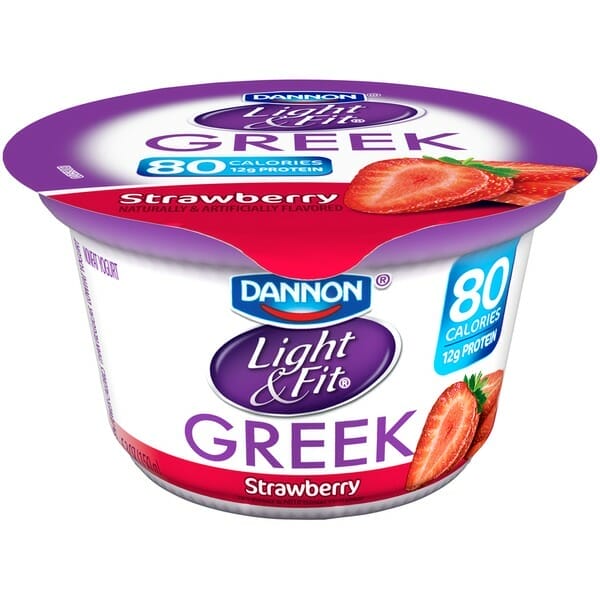
To understand how artificial sweeteners have become so popular, we have to look back at the evolution of our eating habits.
Before our ancestors started farming and domesticating animals about 10,000 years ago, humans were hunter-gatherers. But even after those historical innovations, modern humans had a diet rich in fat, protein and complex carbohydrates.
Then, sometime at the beginning of the 20th century, the lipid hypothesis was born. This medical theory postulated that fatty food, and particularly cholesterol, causes heart disease. As a result, food manufacturers started to offer fat-free or “light” products.
What turned the misguided initiative of the food industry into a global catastrophe was the fact that governments around the world added low-fat recommendations to their dietary guidelines. Of course, food without fat tastes like crap… unless you add sugar.
At the time, most consumers thought that “light” meant healthy — but the exact opposite was the case. When the nation finally realized that low-fat/high-carb is very bad for health, food manufacturers responded by replacing sugar with something potentially worse.
You guessed it: Artificial sweeteners. Do you see a pattern here?
Funny enough, despite all the light and low-calorie food and beverages on the market today, weight gain and obesity are rampant in our society. However, many consumers are still convinced that reducing their calorie intake by eating artificially sweetened food can help them lose weight.
That’s just not the case! Losing weight starts with a healthy dietary lifestyle — not a diet — that includes wholesome foods and plenty of fat.
Proliferation of Artificial Sweeteners

If you look through the aisles of your local grocery store, you can find artificial sweeteners in numerous products, including:
- Drinks (such as diet soda)
- Baked goods (artificially sweetened)
- Supplements (such as pre-workout or protein powders)
- Shakes and meal replacement drinks
I consider diet soft drinks and other no-calorie beverages to be one of the most underestimated risk factors for our health — frankly, they should come with a warning label.
In the past, some nutritionists have argued that diet soft drinks can be an ideal option for those who are looking to lose weight or transition away from sugar-loaded beverages. I disagree!
The best alternative to unhealthy beverages is water, tea or coffee. That’s it! Numerous studies have proven that there’s a direct correlation between gaining body weight and the intake of diet drinks containing sugar substitutes.
Other studies have shown that there’s an over 65% chance of developing diabetes from having nine or more diet drinks per day.
Additional Risks of Consuming Artificial Sweeteners
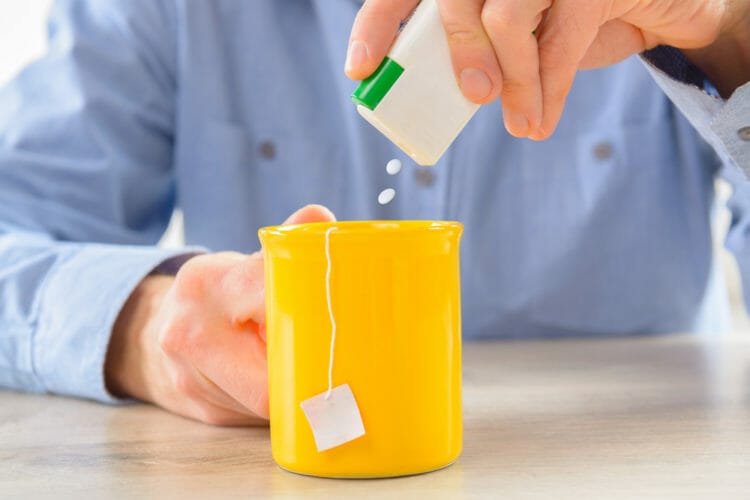
Aside from all the factors I already mentioned, artificial sweeteners can also negatively impact the levels of certain hormones in your body.
For example, prolactin is one of the hormones that sugar substitutes can affect in both men and women. If concentrations of prolactin get too low, men can experience deficiencies in testosterone levels. On the other hand, women can experience issues with their menstrual cycle if there’s too much prolactin present in the body.
Although many people believe they have found success with artificial sweeteners, research has shown that there’s a correlation between these alternatives and obesity. That’s because artificial sweeteners can change the makeup of the biome in your digestive system, making you feel less full than you are. That leads to increased food intake, overeating, and obesity.
Additionally, some studies have suggested that the use of excessive amounts of artificial sweeteners increases the chance of developing bladder cancer. However, considering that artificial sweeteners are present in so many different unhealthy sources of food, other ingredients could also be at play here.
As for sugar alcohols being used as a sugar substitute, studies have demonstrated that even though this type of sugar comes from fruit, it’s often highly processed. Additionally, sugar alcohols can disrupt and impact your gut bacteria, causing inflammation. Ultimately, that can lead to weight gain and the development of symptoms associated with metabolic syndrome.
Frequently Asked Questions
Below is a list of questions I have gotten from readers. I’ll make sure to update this section as I receive additional feedback and comments.
In short, no! As you probably surmised from reading this article, I recommend avoiding all sweeteners — natural or otherwise — as much as possible. They’re not necessary and provide no meaningful nutritional benefit. If you need a particular food sweetened, you can opt for a product like monk fruit extract that science suggests poses the least health risk. But if you can skip the sweetener altogether, you’ll be better off overall.
And keep in mind that this is largely a matter of taste; once you start weaning yourself off of sugar and sugar alternatives, you will find that you’re less drawn to foods with a sweet taste.
I realize that cutting out sweet foods and drinks is easier said than done. Corn syrup, fructose, white sugar and other additives are everywhere in our society. But I sincerely believe that your commitment to living healthier today will pay dividends down the road.
I would argue that both are equally bad. High fructose corn syrup is a highly-processed sugar that leads to a spike in insulin levels without providing any nutritional benefits.
Low-calorie artificial sweeteners won’t increase your blood glucose levels but they do influence how your body responds to glucose. At the same time, they provide zero nutritional benefits.
So when it comes to the sweeteners vs. sugar debate, my recommendation is to stay away from both!
That’s an excellent question that I don’t have a definitive answer for. What I do know is that you can find both stevia and monk fruit extract in nature, which means that our ancestors had access to those type of sweeteners. Sucralose, on the other hand, is made in a lab; there’s nothing natural about it.
However, both stevia and Sucralose have zero calories, and you could argue that stevia might also confuse the body’s chemical processes related to glucose metabolism.
That’s one of the reasons why I have reduced not only my sugar consumption, but also my consumption of all sweeteners. In general, I have a pretty simple view of food: I assume that sweet food is usually not good for me, and if I have the choice I’ll choose something fat over something sweet.
The Wrap-Up
Most of us have realized by now that consuming a high amount of carbohydrates, and especially simple carbs like refined sugar, is not healthy. Unfortunately, the solution the food industry has offered to this problem is not a solution at all.
I would argue that artificial sweeteners make our global health epidemic even worse. There’s clear evidence that sugar substitutes increase the risk of glucose intolerance (hypoglycemia or pre-diabetes), diabetes mellitus itself, metabolic syndrome, and even obesity.
That’s why I highly recommend avoiding any artificial sweeteners and, instead, using truly natural alternatives such as monk fruit extract and stevia (and only in moderation). Remember, there’s a lot more that goes into your health than just your caloric intake.

Michael Kummer is a healthy living enthusiast and CrossFit athlete whose goal is to help people achieve optimal health by bridging the gap between ancestral living and the demands of modern society.
Medical Disclaimer
The information shared on this blog is for educational purposes only, is not a substitute for the advice of medical doctors or registered dieticians (which we are not) and should not be used to prevent, diagnose, or treat any condition. Consult with a physician before starting a fitness regimen, adding supplements to your diet, or making other changes that may affect your medications, treatment plan or overall health. MichaelKummer.com and its owner MK Media Group, LLC are not liable for how you use and implement the information shared here, which is based on the opinions of the authors formed after engaging in personal use and research. We recommend products, services, or programs and are sometimes compensated for doing so as affiliates. Please read our Terms and Conditions for further information, including our privacy policy.
